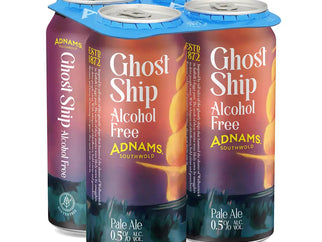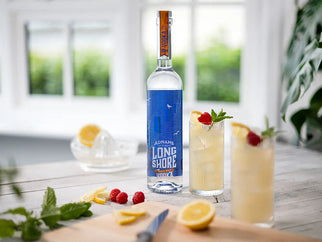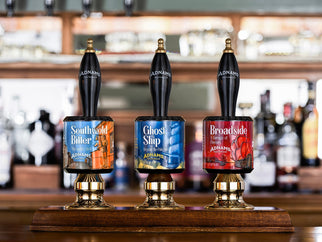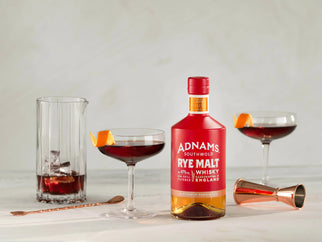Gather your friends for a Beach Break; a Keller Lager from Adnams and Utopian Brewing from Crediton in Mid Devon. Utopian’s icon has swapped her traditional tools for a paddleboard and wetsuit as we look forward to sunnier days.
We wanted to produce an authentic lager for the summer, and this is Utopian’s speciality. Utopian’s head brewer, Jeremy Swainson trained in Germany, and they craft a wide range of lager styles with 100% British ingredients.
Our pale gold Keller Lager is crisp and refreshing and beneath its white, foaming head there are waves of lemon and cut grass aromas that just sing of summer. This is balanced by light cereal and biscuit notes and just a hint of pepper. We brewed with Adnams’ own malted barley from Norfolk and British hops that provide a Bohemian-style late kettle aroma while reflecting our home-turf terroir. Plus, we kept our kellerbier unfiltered, for that just-tapped taste of the beerhall.
Kellerbiers are often served straight from the cellar or from a wooden barrel. This process of serving and the fact there is often yeast in suspension made our head brewer, Dan, think this would be the perfect style for a cask beer.
Working with Utopian has been brewing for a long time. Dan first met Jeremy at Charles Faram’s Well-Hopped Series, where brewers were invited to sensory-assess existing commercial hop varieties at all stages, including early breeding. They were excited at the prospect of brewing something special together and using English hops.
We used Fuggles and Godiva hops and East Anglian Munich malt, as expressing our home-grown attributes was key for this beer. “We love English hops here at Adnams,” said Dan, when the brewers met over a pint of Southwold Bitter. “The history of Adnams has been built on English hops - particularly Fuggles,” he added, raising his glass. “We love what English hops can do for a beer.”“ Jeremy was schooled in Germany, so he brought the methodology, and we have our history with cask. I think it’s quite a nice marriage,” said Dan. “British brewing culture is actually quite similar to German brewing culture - maybe we're not as different as we might think.”
“Exactly,” agreed Jeremy. “I mean, that's where we came at this project from, isn't it? You guys have been doing cask, you've got this incredible heritage, and we're talking about some of the fantastic beers that we've had in Germany that have essentially come out of wooden casks. The idea was that we could both draw on our skill sets and come together.”
We also fermented with a lager yeast, as modern kellerbiers have evolved into an expression of an unfiltered lager. Our summer lager will be unfiltered in all formats, in line with the kellerbier style, so it will have a natural haze when you pour it, on cask, in keg and in 440ml cans. It is also unfined, so it will be vegan.
Speaking of the merits of cask lager, Dan noted: “I think for me, what makes that serving style so beautiful (and I was in Munich some time back), is that it's less carbonated - not flat, because cask beer should never be flat. It’s also not as cold, so the flavour intensity is higher. So, it's kind of a purist form I feel.”
The style we were aiming for was somewhere between a Helles and a Pilsner in malt character, but because we were brewing for cask, Jeremy also wanted lots of hop character. “I think a bit of bitterness goes a long way, especially in cask ale. We didn't want to really lowball it and go with a pure Helles-style lager. So, it's got some hop character, which is going to carry through I think, and make it more sessionable."
We are known for using Fuggles and Jeremy likes Godiva: “Godiva comes across like lemon and lime, with a little subtle fruit to it. And we used lots of Fuggles as well, as it’s a noble hop from England. You get that kind of floral note, a little bit of lemon, but you also get those classic hints of black pepper. I love that. We wanted to use pale malt, so it'll be sort of crisp and bready, but we're not going to go for caramel notes or anything like that. We wanted to keep it nice and clean.”
“Absolutely,” said Jeremy. “I mean, we're both firm believers, that cask should be drunk as fresh as we can, and I think brewing this style of lager and putting it in cask is going to go brilliantly because people love lager in this country and we’re just switching the vessel you're getting it in. Hopefully it will introduce some new drinkers to the cask category. That'd be great. I’m very excited for this!”“And thirst-quenching in the summer months as well,” added Dan. “Having this crisp cask lager, opening up that pantheon of what cask beer can be, is quite an exciting prospect.”
“You might have to stay another day,” said Dan, laughing. “That wouldn't be the end of the world,” replied Jeremy, taking another sip of Southwold Bitter.





